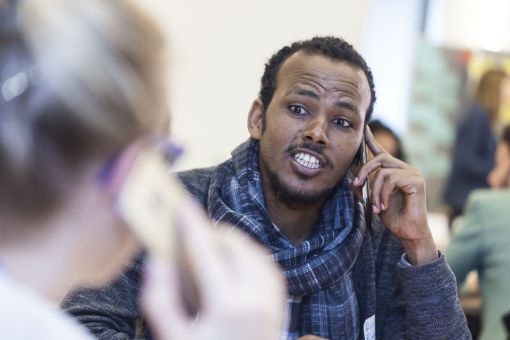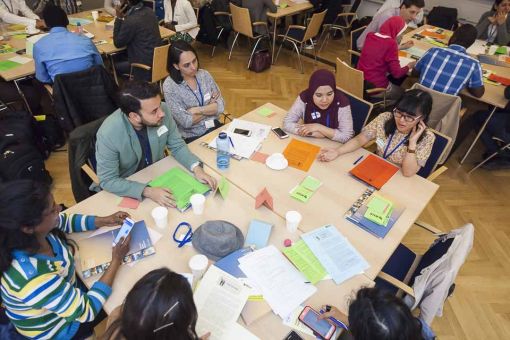Studying in Germany is not their only connection. They have a question in common: “How can we succeed upon return?” In fact, this was the topic at the Network Meeting of the Development-Related Postgraduate Courses (EPOS) and the degree courses of the Helmut Schmidt Programme. 40 scholarship holders from all over the world came together at the DAAD headquarters in Bonn.

Conversations with contacts back home: Scholarship holders trained how to use their network in a role play © DAAD/Michael Meinhard
Scholarship holders were reticent at first, but “get-to-know-you bingo” soon broke the ice. They had one hour to find a partner who, for instance, played the same sport or had already lived in more than two countries before his or her stay in Germany. Soon they were all talking with one another, discussing their studies and private lives. The mood was relaxed and cheerful, and it stayed that way. “The scholarship holders were extremely friendly and open to discussion”, says DAAD employee Julia Hillmann.
Between Happiness and Uncertainty
The two-day network meeting was dedicated to the challenge “Return and Reintegration”, a topic that concerns many scholarship holders. This was reflected in the discussions. The thought of returning home triggers a variety of feelings in the students – from happiness to confusion, even uncertainty.
As the discussion began, worries about finding a good job and advancing career paths were the main topics in each of the five groups. Thanks to their degree programmes, the scholarship holders are now highly qualified for practice, but they expect to face complex challenges during the reintegration process in their home countries, including obstacles that will make re-entering the job market difficult.
“My programme enables young professionals to address agricultural challenges as part of a system”, reports Jake Carampatana from the master’s programme in Agricultural Science and Resource Management in the Tropics and Subtropics at the University of Bonn. “But the Philippine agriculture job market currently demands more narrowly specialized qualifications. I face the challenge of making my broad expertise relevant and visible – and applying it in high-impact career prospects.”
Help for Returning Experts
Corruption, a non-transparent job market and lack of contacts prevent even qualified professionals from finding well paying jobs. But the scholarship holders can fall back on many types of support. Bianca Kunz from the Centre for International Migration and Development (CIM) presented many options that can facilitate reintegration. If certain prerequisites are met, the CIM offers financial support, helps to forge contacts with potential employers, such as specialised institutions, and with other “returners” in the home country.
AGEP (Arbeitsgemeinschaft entwicklungsländerbezogener Postgraduiertenprogramme), an umbrella institution of development-related postgraduate programmes, introduced network coordinator Robin Pass. This organisation offers workshops and networking opportunities. It supports interdisciplinary cooperation and facilitates reintegration.

Getting to know eachother and joint discussions – this is what the participants of this year’s network meeting came for © DAAD/Michael Meinhard
Personal Initiative Pays Off
Networks are particularly essential for students like Laura Lopez from Colombia, who represents the master’s programme Development and Governance at the University of Duisburg-Essen. “In my home country and especially in my field, success often depends on relationships to friends and family. Our system is based on Vitamin C as in Contacts.”
But the existing personal network in the home country is often insufficient to facilitate a quick and successful entry into professional life. This was demonstrated in a reintegration role play directed by Dr. Julia Boger from the World University Service (WuS) . Important factors are planning for return early on, special training in how to apply for a job, career counselling, but especially forming contacts to many other scholarship holders, alumni, potential employers and institutions while still in Germany.
The Network Meeting 2017 was already the first step. “Networking is the key to success!”, says Daniel Ortiz of Venezuela from the master’s programme International Studies in Aquatic Tropical Ecology at the University of Bremen. “I’ve met many active and committed people here with whom I can well imagine cooperating in the future.”
Impressions from the workshop in our image gallery on facebook.





